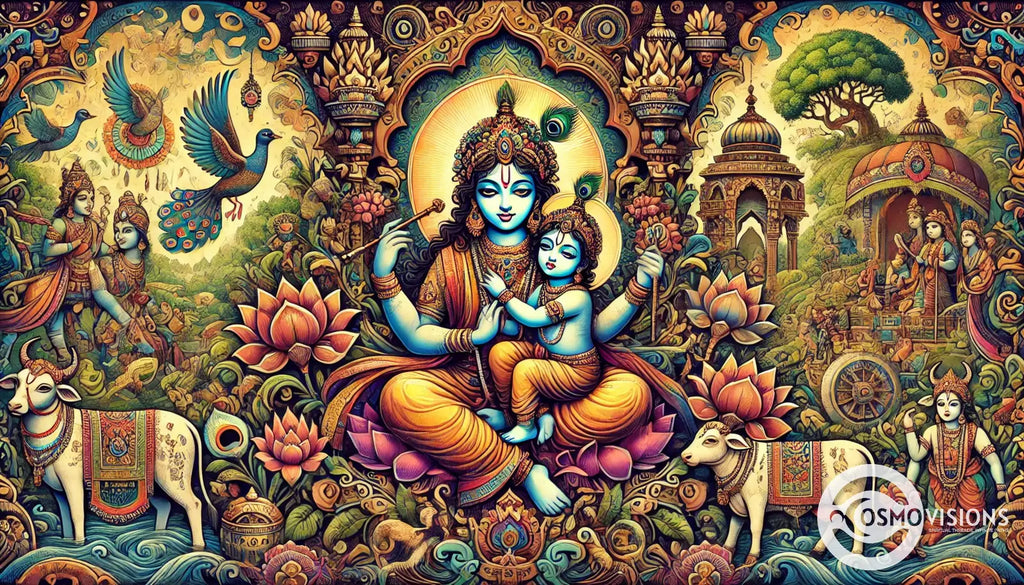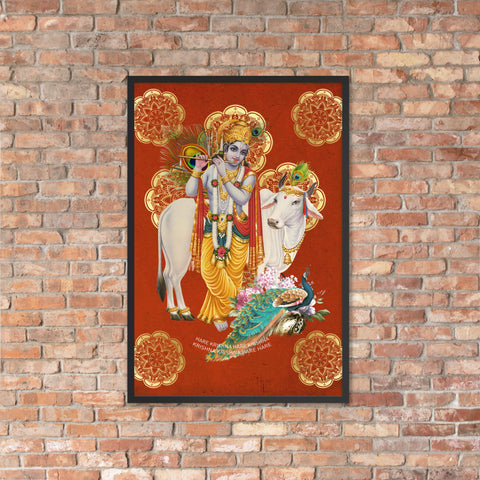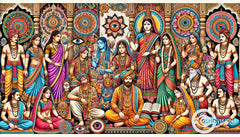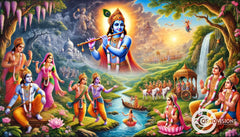Krishna Yashoda - Embracing the Love of Mother Yashoda and Lord Krishna
Posted by Massimiliano Geraci

In the tapestry of Hindu mythology, the bond between a mother and her child holds profound significance, yet among these myriad relationships, one stands unparalleled: the love between Mother Yashoda and Lord Krishna.
This unique relationship transcends the ordinary, plunging deep into lessons of unconditional human love and divine devotion. It's a story that resonates with many seeking to understand the essence of maternal affection in its highest form.
Mother Yashoda is not Lord Krishna’s biological mother; that honor goes to Devaki who bore him in a prison cell only for him to be whisked away to safety from his uncle Kamsa's wrath.
Raised by Yashoda and Nanda in Vrindavan, Krishna’s early years under their loving care shine brightly as examples of divine love manifesting in daily life. Our journey through this blog will uncover how Mother Yashoda's unwavering devotion and maternal love played a crucial role in nurturing not just an avatar of Vishnu but also setting an eternal example for devotees worldwide.
Discover why her story remains celebrated across ages.
Join us on this spiritual expedition.
Who is Mother Yashoda in Sri Krishna's Story?
Transitioning from the introduction to exploring significant figures in Sri Krishna's narrative, we find Mother Yashoda as a central character in these tales. She emerges embodying maternal love and devotion in the story of Hindu God Krishna.
As the foster mother of Sri Krishna, Yashoda's role transcends mere caretaking, encapsulating an unparalleled depth of affection and care for little Krishna. Her relationship with him is pivotal, showcasing the profound bond shared between them.
Yashoda became Krishna’s foster mother through divine orchestrations that saw infant Krishna whisked away from his birth parents, Devaki and Vasudeva, to save him from King Kamsa’s cruel intentions.
This act led her to unknowingly nurture the supreme godhead under her roof in Vrindavan. Her life symbolizes boundless maternal love (‘Vatsalya Bhakti’) and plays a crucial role in Vaishnavism for illustrating unconditional devotion towards God.
Stories of her chasing naughty child Krishna or marveling at cosmic visions within his mouth have enchanted devotees across generations, making Yashoda an immortal epitome of motherhood in Hindu mythology and spirituality.

What role did Yashoda play in Krishna's childhood?
Yashoda, the wife of Nanda and a figure revered across the doctrines of Vaishnavism, embraced an indispensable role in Lord Krishna's early life as his foster mother. Her maternal affection for Krishna defined her character and set a paradigm for divine love (Vatsalya Bhakti).
Yashoda nurtured and cared for Krishna with boundless love, protecting him from various threats. She witnessed his divine plays (leelas), including the miraculous visions inside Krishna’s mouth, signifying her glimpse into his cosmic essence.
Despite realizing Krishna was no ordinary child, Yashoda's love remained unwavering, illustrating the depth of a mother's unconditional love.
Krishna's antics under Yashoda’s watchful eyes were central to shaping the narrative of his childhood in Vrindavan. From breaking pots to releasing Nalakuvara and Manigriva from their curse by Sage Narada, each act played its part in portraying Yashoda’s pivotal influence on Krishna.
She disciplined him like any child yet celebrated his godliness subtly through her actions and reactions to his miracles. These stories are not just accounts but serve as moral and spiritual lessons that emphasize compassion, devotion (bhakti), and the power of absolute faith between parent and child within Hindu mythology.
How did Yashoda become Krishna's foster mother?
In the deeply spiritual landscape of Vrindavan, amidst the melodious sounds of Yamuna river, the story of Yashoda becoming Krishna's foster mother unfolds with divine intervention.
As per the narratives cherished in Vaishnavism, Vasudeva Krishna was born to Devaki and Vasudeva in a prison cell of Mathura, ruled by the tyrant Kamsa. To protect Vasudeva Krishna from Kamsa's wrath, who was destined to be killed by Devaki's eighth child, Vishnu directed Vasudeva to carry his newborn son across the Yamuna and leave him with Nanda and Yashoda in Gokul.
The dark night when this exchange happened witnessed miracles like a softened river of earth making way for Vasudeva carrying baby Krishna on his head.
Upon reaching Gokul, Vasudeva found Yashoda had given birth to a daughter named Yogamaya (the divine illusion), facilitated by Goddess Mahalakshmi's grace for ensuring Lord Narayana’s safe passage into earth as Krishna.
In compliance with divine instructions without waking anyone, he gently placed Krishna next to Yashoda and took her newborn daughter back to Mathura. This act made Yashoda unknowingly become the foster-mother of Sri Krishna - fostering an unbreakable bond marked by pure love and maternal care which later became iconic throughout tales spread across Braj and beyond into every devotee’s heart within ISKCON circles around India.
What is the significance of Yashoda in Vaishnavism?
Yashoda holds a pivotal position in Vaishnavism, embodying the supreme expression of maternal love, or 'Vatsalya Bhakti', for Lord Krishna. Her role as Krishna's foster mother showcases a unique aspect of divine affection in Hindu spirituality.
Yashoda's unconditional love and nurturing of Krishna, despite knowing his divine nature, exemplify how human relationships can mirror the highest forms of devotion in Vaishnavite traditions.
Her interactions with Krishna provide believers with insights into the nature of pure bhakti—where devotion stems not from awe of the divine but from an intimate, personal connection.
Mother Yashoda could see a deeper aspect in Krishna; she beheld the Supreme Personality of Godhead yet chose to love him as her son.
This narrative enriches the spiritual tapestry by demonstrating that divine love transcends mere reverence; it includes playful chastisement and tender care characteristic of a mother's love for her child.
Yashoda’s life narrates tales where she sees past Krishna's mischiefs to nurture him with deep affection—a gesture underscoring that true devotion binds the believer to God beyond any formality.
Through events like opening his mouth to reveal the universe, chastising him gently for his antics, or fainting at threats to his safety show how Vatsalya Bhakti transforms ordinary actions into acts weighted with profound spiritual significance within Hindu practice and art—vividly immortalizing Yashaodha’s unparalleled place as an eternal figure representing boundless maternal love within Vaishnavism.

What Penance Did Yashoda Perform to Attain Krishna?
In her previous life, Yashoda undertook an arduous journey of devotion and penance, a path that ultimately led to her being blessed with the privilege of mothering Lord Krishna in his earthly form.
Deeply immersed in prayers and rigorous worship, she appealed to the goddess Adishesha, beseeching for the grace to be bestowed upon her the powers to nurture the Supreme Lord himself.
This exceptional act of faith and perseverance transcended ordinary devotion, elevating Yashoda to a divine stature within Vaishnavism.
Yashoda's penance was not marked by mere rituals but was a profound demonstration of unyielded love and dedication to achieving a spiritual union with Vishnu. Her devout practices included fasting, meditating beside the seven oceans, and engaging in continuous chants that echoed her deep yearning for divine motherhood.
It is believed that these extraordinary efforts pleased Adishesha, leading Vakula Devi - an incarnation of Adishesha - to prophesy that Yashoda would indeed be graced with such an honor.
Thus through unwavering belief and spiritual endurance, Mother Yashoda's dream transformed into reality as she became Krishna’s foster mother on earth – a tale celebrated across generations for its depiction of ultimate maternal love.
‘Enna Thavam Saidhanai’ - “What Penance Did You Perform?”
The phrase ‘Enna Thavam Saidhanai’ encapsulates a profound spiritual inquiry, hinting at the intense spiritual effort or penance undertaken by someone to earn the divine privilege of mothering the mother of Lord Krishna.
This Tamil expression, deeply rooted in Vaishnavism and echoed through centuries of lore, symbolizes Mother Yashoda's unparalleled devotion and love for Sri Krishna. Her life exemplifies an ardent yogi’s journey, marked by unwavering faith and selfless service (seva), which ultimately bestowed upon her the powers to nurture the supreme hindu deity as a child.
The curiosity surrounding what kind of divine acts Yashoda must have performed in her previous life or births to gain such a favor from the universe underscores her esteemed position among devotees.
Yashoda's story transcends mere mythology, weaving its essence into various cultural expressions including bhajans and kirtans that celebrate her relationship with Krishna. These accounts are not just tales but lessons on vatsalya bhakti (devotion of a mother) that continue to inspire generations across Vraja where she is revered till date.
Through engaging with these narratives, one steps closer to understanding the mystical bond between divinity and devoutness—a theme further explored in stories illustrating how infant Krishna was raised by Mother Yashaoda.
The Story Behind Yashoda’s Divine Boon
Yashoda's role as the foster mother to Lord Krishna encapsulates a divine saga that has been celebrated for centuries in Hinduism, particularly within Vaishnavism. Legends articulate how Yashoda was granted the boon to nurture the avatar of Lord Vishnu due to her unwavering devotion and penance.
The narrative unfolds in Vrindavan, where Yashoda and Nanda lived, painting a vivid tapestry of divine love and maternal bond that transcends ordinary kinship. This story underscores not just the power of celestial blessings but also highlights human virtues like dedication and love, elevating Yashoda's stature among devotees around the world.
“Enna thavam saidhanai, Yashodha” - reflecting on what penance Yashoda undertook to be bestowed with such an honor.
Devotional texts recall her countless sacrifices and acts of worship aimed at being blessed with a child who would embody divinity itself. It is this devout longing that culminated in her becoming Krishna’s mother—symbolizing how deep faith can bring about miraculous events.
Through raising Krishna, she experienced both his mischievous antics and moments of profound wisdom beyond his years; these aspects are woven into the cultural fabric through tales passed down generations.
Her life with Krishna serves as foundational episodes that inspire followers towards a path of loving devotion (bhakti) —showcasing how pure affection can transcend even cosmic boundaries set by fate itself.
How Was Infant Krishna Raised by Mother Yashoda?
Mother Yashoda raised infant Krishna with unwavering love and care, embodying the essence of maternal devotion in Hinduism. Her days were filled with joyous tasks, from feeding Krishna butter to soothing his cries.
Legends say she tirelessly chased after little Krishna as he engaged in playful antics, like breaking pots and playing pranks on the gopis. These stories symbolize the divine relationship between a devotee and God, illustrating how Yashoda's unconditional love for Krishna transcended ordinary mother-child bonds.
Krishna's early years in Vrindavan under Yashoda's care were marked by his birth and numerous miraculous events that underscored his divine nature. Despite these supernatural occurrences, such as revealing the entire universe inside his mouth or effortlessly killing demons sent by King Kamsa of Mathura to harm him, Mother Yashoda's affection never wavered.
She treated him as her beloved child, not just a divine entity. This balance between acknowledging Krishna’s godhood while nurturing him as a son highlights the profound spiritual connection fostered through daily life activities—an essential teaching of Vaishnavism that celebrates God's accessibility through pure love and devotion.
A Glimpse into Krishna's Early Years
Krishna's early days under Yashoda's care in the pastoral areas of Vrindavan come alive with tales that blend divine playfulness and maternal devotion. She became his foster father and mother, creating a bond celebrated across centuries within the narratives of Hinduism.
The young Krishna, often referred to as Bala Krishna, engaged in numerous antics that delighted and sometimes vexed the residents of Nanda’s community. His youthful exploits included stealing butter from churns secured high out of reach, symbolizing the joyous innocence and godly miracles defining his character.
Yashoda’s love for Krishna transcended ordinary affection, embodying a cosmic principle revered in Vaishnavism. Her challenges were unique; she raised a child who was playing with universal forces.
Instances where Krishna opened his mouth to reveal the whole universe showcased his divine nature to Yashoda, yet her love remained unwaveringly human. This period saw Krishna forming deep bonds not just with Yashoda but also engaging with peers like Balarama, hinting at future alliances that would shape many events in their lives.
The tales from this epoch remain cornerstones of spiritual discourse and artistic expression among devotees around Patala and beyond, capturing hearts through millennia.
Stories of Yashoda's Maternal Love and Care
Yashoda's maternal love for Krishna shines brightly through tales of her nurturing and protection. Each day in Vrindavan, she watched over him with unwavering care, a testament to 'mother’s love'.
From the moment Krishna played in the sand outside their home until he returned at sunset, Yashoda ensured his safety and happiness. Her dedication was profound; when Krishna mischievously broke pots or ventured into forbidden areas, Yashoda's response blended discipline with immense affection.
Stories recount how she tied him to a grinding stone to keep him nearby, an act symbolizing the deep bond between them.
Yashoda's reactions to Krishna opening his mouth revealed cosmic visions or engaging with divine entities like the formidable Kali serpent showcase her extraordinary role as a foster mother entrusted with divine responsibilities.
Whether comforting Krishna after his encounters or rejoicing in his playful antics that involved animals from Nanda’s (Hinduism) herd, her actions mirrored a profound connection endowed by spiritual destiny.
Her journey reflects an unparalleled narrative of maternal devotion within spirituality and Indios art circles, celebrating Yashoda as an emblem of boundless love and caretaker of divinity itself.
How Yashoda Handled Little Krishna’s Antics?
Mother Yashoda displayed unparalleled patience and wisdom in managing the playful and sometimes mischievous antics of little brother Krishna. She balanced love and discipline, understanding that her brother Krishna was not an ordinary child but the avatar of Vishnu, destined for greatness.
Yashoda's response to Krishna's behavior was a blend of maternal instinct and divine insight. When Krishna playfully broke the pots or engaged in harmless pranks with the other children, she would pretend to scold him only to embrace him with all her heart moments later.
Despite knowing his divine nature, she treated him as her son first, embodying god and unconditional love.
Her approach to Krishna’s upbringing serves as a timeless example of Vatsalya Bhakti—a devotional love filled with tenderness and affection towards God perceived as one’s own child.
This form of devotion mirrors Yashoda's relationship with Krishna: pure, selfless, and all-encompassing. Through her actions, Yashoda teaches us that true devotion doesn't just come from recognizing divinity in every aspect of life but also embracing it with both discipline and love.
Krishna playing in the sand
Next lies the exploration into why Yashoda's unwavering adoration for Krishna captivates hearts beyond temporal confines; shedding light on how this sublime expression resonates within 'Vatsalya Bhakti'.

Why Is Yashoda's Love for Krishna So Celebrated?
Yashoda's love for Krishna embodies the essence of Vatsalya Bhakti, a devotion marked by maternal affection and care. This unique bond transcends the ordinary, situating Yashoda in the hearts of devotees as the epitome of unconditional motherly love.
Through her nurturing, Yashoda enabled Krishna to reveal his divine play (lila), capturing moments where she would chase after him for his mischiefs or gaze upon him with pure adoration.
Her dedication to Krishna is celebrated not just as tales of a mother's love for children but as profound spiritual lessons that teach humanity about selfless love and devotion.
These accounts and legends have been immortalized in various art forms, from paintings capturing Yashoda’s tender moments with baby Krishna to bhajans echoing her sentiments. The narrative threads linking Sri Krishna with his foster mother ignite a deep sense of reverence across cultures, serving as a beacon for those exploring spirituality through the prism of familial bonds.
Transitioning from these heartfelt stories helps us understand how this widely revered a figure is honored within ISKCON and Vrindavan circles, further cementing Yashoda's central role in Vaishnavism.
The Concept of ‘Vatsalya Bhakti’
The concept of ‘Vatsalya Bhakti’ illuminates the unique spiritual relationship characterized by a mother's pure and unconditional love for her child, as epitomized in the bond between Yashoda and Krishna.
This form of devotion stands out in Hinduism, where devotees worship Sri Krishna with the same intensity and affection that Yashoda showed towards him, despite not being his biological mother.
Embracing such maternal love elevates their spiritual connection, leading followers to experience divine bliss through this nurturing bond. Acknowledging this profound emotion enriches one’s spiritual journey, making ‘Vatsalya Bhakti’ a significant element in Vaishnavism.
This sacred sentiment transcends the mere acts of feeding and caring seen in mundane life; it mirrors into spiritual dimensions where devotees see themselves as caregivers to the divine Krishna—serving Him with utmost tenderness akin to that of Mother Yashoda.
Temples across Vrindavan celebrate this heavenly bond during festivals like Janmashtami, echoing chants and hymns that resound with tales of Yashoda's boundless love for little Krishna.
This narrative paves the way to understanding how devotional practices dedicated to Yashoda within ISKCON communities illustrate reverence beyond conventional paradigms.
Accounts and Legends of Mother’s Love
Transitioning from the concept of ‘Vatsalya Bhakti’, which illustrates a mother's unconditional love for her child, we explore the accounts and legends that vividly narrate Mother Yashoda’s profound affection towards Sri Krishna.
Legends tell us how Yashoda’s life was intertwined with divine love and care from the moment Krishna became her son. She witnessed miracles that defied logic, such as when young Krishna showed the universe in his mouth upon being accused of eating mud.
Such stories symbolize maternal love and illustrate a deeper spiritual connection where Yashoda is revered as an embodiment of universal motherhood.
What penance did you perform to be blessed with a child like Krishna? wonders society, recognizing Yashoda's unparalleled devotion.
The tales of Yashoda punishing Krishna only to teach him valuable lessons; her tireless efforts to protect him from Putana; and her amazement at seeing celestial visions when she looked into Krishna's mouth—all showcase a relationship transcending biological ties.
These narratives form an integral part of Vaishnavism, echoing through time in temples dedicated to Shri Krishna across Vrindavan and beyond. Celebrations like Janmashtami vividly recreate scenes from their lives, inviting devotees worldwide to immerse themselves in this supreme example of motherly affection—a theme celebrated extensively in Tamil language songs, kirtans involving Radha, and diverse cultural expressions emphasizing that true parental love holds the power to touch the divine.
How Is Yashoda Revered in ISKCON and Vrindavan?
In ISKCON and Vrindavan, Yashoda holds a special place, revered for her unconditional love and devotion for Krishna. Devotees celebrate her through various devotional practices and seva (service), acknowledging her pivotal role in the life events of Sri Krishna.
Temples dedicated to this divine maternal bond between Yashoda and Krishna are abundant, with festivities marking significant moments from their lives. These celebrations often include enacting scenes from Krishna and yashoda's household and childhood, singing bhajans that narrate stories of Yashoda's deep affection, and offering prayers to invoke her blessings.
Engaging in these spiritual activities allows followers to connect deeply with the essence of Vatsalya Bhakti (devotion stemming from a mother's love). This form of worship honors the historical figures of Yashoda and Krishna and elevates the mundane to divine, mirroring the profound connection shared between them.
The annual celebration known as Janmashtami exemplifies this reverence at its peak in both ISKCON centers worldwide and within Vrindavan’s sacred environs where devotees gather in large numbers to re-live the joyous moments of Krishna’s arrival into Yashoda’s world.
Through such expressions of faith and adoration rooted in centuries-old traditions, Yashoda continues to be venerated as a symbol of supreme maternal devotion across generations.
The Devotional Practices and Seva Dedicated to Yashoda
Devotees across the globe honor Yashoda's maternal love through various traditional practices and seva (service) activities. Temples dedicated to Sri Krishna often organize special events highlighting Yashoda's significant role in his divine life narrative.
Devotional singing, including famed bhajans that tell tales of Yashoda and Krishna’s endearing relationship, form a core part of these spiritual gatherings. Service acts or sevas are undertaken with great reverence; they draw inspiration from Yashoda’s own devotion to Krishna, aiming to emulate her boundless love and care.
Celebrations at these temples during festivals like Janmashtami showcase dramatic re-enactments of scenes between mother Yashoda and child Krishna, bringing the stories alive for devout followers.
The participants dress up as characters from the Mahabharata, engaging audiences with performances that underscore the deep bond shared by the foster parents as mother and divine child. These acts reinforce cultural traditions and instill values of unconditional love and devotion among attendees, resonating deeply within the hearts of those who cherish the teachings embedded in Vaishnavism.
Moving forward, let us examine how temples and celebrations further immortalize this cherished connection between Yashoda and Krishna.
Temples and Celebrations Honoring Yashoda and Krishna
Transitioning from the heartfelt devotional practices and Seva dedicated to Yashoda, many Hindu temples across India serve as pivotal landmarks where devotees gather to honor the sacred bond between Yashoda and Krishna.
These religious sites are not just architectural marvels but also spaces filled with vibrant celebrations that bring the tales of Yashoda's love and Krishna's antics to life. Particularly during festivals like Janmashtami, which marks the birth of Sri Krishna, temples turn into hubs of joyful expressions with reenactments of stories showcasing Yashoda's maternal affection.
In Vrindavan, a city deeply woven into the lore of Krishna and considered his childhood abode, special events highlight Yashoda’s immense love for her divine foster son. Here, Nanda (Hinduism) plays a significant role as well since he is recognized alongside Yashoda in these festivities.
Devotees partake in rituals that symbolize moments from Krishna’s younger years such as breaking pots (Dahi Handi) or swinging cradles. These traditions reflect deep-rooted cultural heritage and reinforce the community’s connection to spiritual narratives that have been passed down through generations within Hinduism.

What's the Krishna and Yashoda Connection with Radha?
Yashoda, Krishna's foster wife and mother, plays a pivotal role in nurturing the divine love that blossoms between Krishna and Radha. Her unconditional love and care for Sri Krishna set the foundation for his relationships, including his bond with Radha.
Stories and bhajans often depict scenes where Yashoda would fondly narrate tales of little Krishna to Radha, further weaving a connection between them. This triad of love among Krishna, Yashoda, and Radha symbolizes the essence of divine affection transcending biological ties.
Krishna's leelas (divine play) under Yashoda's watchful eyes in Vrindavan become legendary narratives shared across generations through famed bhajans and kirtans involving Yashoda.
These songs celebrate her maternal devotion and highlight how she facilitated encounters between Krishna and Radha, thus playing a crucial role in their eternal romance. Through these acts of love and care, Yashoda cements herself as an indispensable link that binds Radha to both herself and Lord Srī Kṛiṣhṇa in an unbreakable chain of spiritual affection.
The Triad of Love: Krishna, Yashoda, and Radha
In the tapestry of Vrindavan's divine love stories, the threads of Krishna, Yashoda, and Radha weave a complex yet harmonious pattern. Krishna flourishes under Yashoda's vatsalya bhakti—a mother's unconditional love—forming an unbreakable bond that transcends biological ties.
This maternal affection becomes the foundation upon which Krishna's romantic and spiritual relationships are built, including his bond with Radha. Radha, representing the pinnacle of devotional love or 'bhakti', complements this triad by adding dimensions of passion and devotion that transcend worldly understandings.
Their interactions showcase a spectrum of divine love: from motherly care to romantic longing.
The stories revolving around this trio enrich Vaishnavism and captivate devotees in ISKCON and across Vrindavan through celebrated bhajans and kirtans. The narrative transitions smoothly into exploring how revered figures within these communities honor Yashoda alongside Krishna, further illuminating their sacred connections across various dimensions of spirituality.
Famed Bhajans and Kirtans Involving Yashoda
Moving from the profound love triangle of Krishna, Yashoda, and Radha to the devotional expressions that immortalize Yashoda's nurturing role, we explore famed bhajans and kirtans dedicated to her.
These spiritual songs capture the essence of Yashoda’s divine motherhood, intricately woven with the threads of Vatsalya Bhakti. Renowned bhajans such as "Yashomati Maiya Se Bole Nandlala," highlight her tender concerns for Krishna's complexion contrasted with Radha's fair skin, showcasing a mother's unconditional love and care.
These musical renditions serve as acts of worship and chronicle the events in which Sri Krishna was born into and raised by Mother Yashoda. The kirtan "Maiya Mori Main Nahin Maakhan Khayo" playfully narrates incidents where Yashoda punished young Krishna for his mischievous butter thief.
Through these artistic expressions, devotees across generations relive the joyous moments between Yashoda and Lord Krishna, further deepening their bond with divinity. Each verse echoes her immense affection towards Krishna, making these bhajans foundational elements in celebrations like Janmashtami across Vrindavan and within ISKCON communities worldwide. It is Krishna's birthday (who was born as the eighth incarnation of Lord Vishnu) that is celebrated every year as Janmashtami.






























